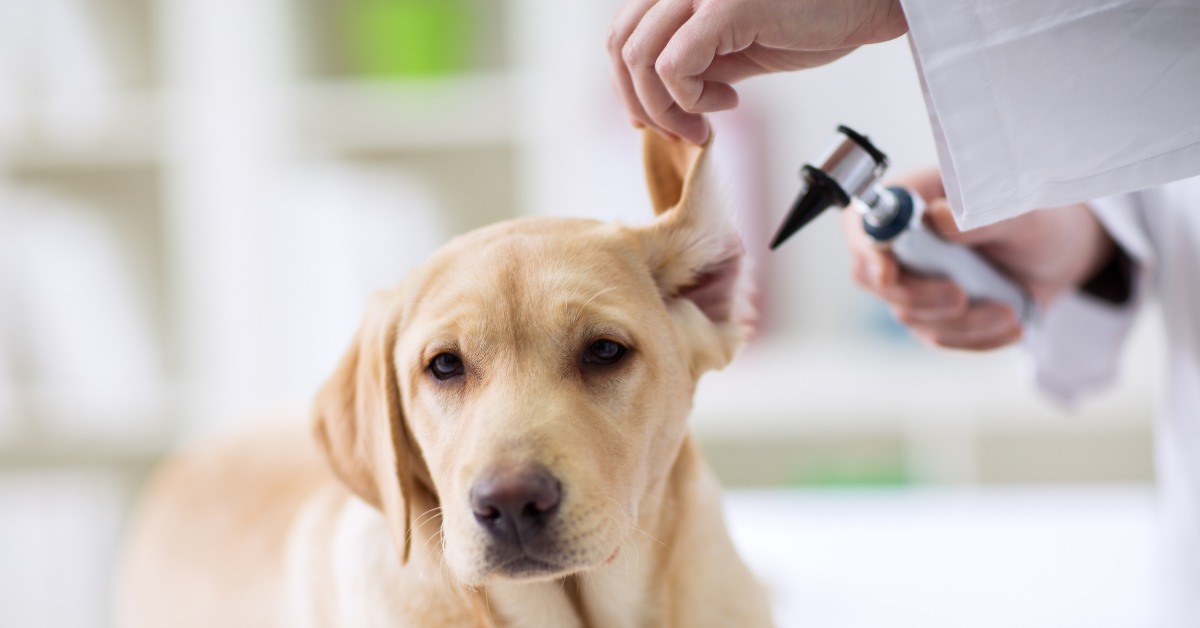Hearing Loss in Dogs: What Does it Look Like?

Making sure your dog is happy and healthy is a top priority for any pet owner, but hearing loss can be very difficult to pick up. There are some breeds that are more prone to hearing loss, but it’s possible for any dog to lose their ability to hear. It’s not uncommon for dogs to lose their hearing as they age, but there are many other causes that could contribute to impaired hearing.
In this blog we’ll go over some of these causes and some signs to look out for, plus a few tips for living with a dog with hearing loss.
Common breeds with hearing loss
While it is possible for all dogs to experience hearing loss, there are certain breeds that are more prone to develop issues with their hearing from birth. In fact, there are more than 30 breeds of dogs that have a higher chance of being born with hearing loss. Some of the breeds include German Shepherds, Terriers, Border Collies, Beagles, Greyhounds, Schnauzers, among others. Research has shown that dogs with white coats have a higher rate of deafness due to the presence of two genes – merle and piebald.
To see a more comprehensive list of breeds that are likely to experience hearing loss that is present at birth, the University of Louisiana has created this chart.
Signs that your dog may have hearing loss:
-
They don’t react to everyday noises, like a car pulling into your driveway.
-
Shaking or tilting of the head
-
Barking for no apparent reason
-
Ignoring verbal commands - sometimes referred to as ‘selective hearing’
-
Changes in your dog’s startle reflex
-
An increase in sleep
Common causes of hearing loss in dogs
There are a number of causes related to hearing loss in dogs, some of which include congenital hearing loss, acquired hearing loss, and age-related hearing loss.
Congenital Hearing Loss
Hearing loss that is present at birth can be a result of genetics, as well as developmental issues in an unborn puppy, potentially caused by toxic or viral damage. As mentioned above, congenital hearing loss is mostly associated with dogs with white coats because of their genetic makeup.
However, other causes of congenital hearing loss include infection before birth; certain medication that is toxic to the ear like some antibiotics or aspirin; liver disorders; trauma or degeneration of the cochlea (the organ of hearing); among other potentially harmful exposures before or soon after birth.
Acquired Hearing Loss
Hearing loss that is developed later in your dog’s life could be a result of the external ear canal being blocked by inflammation, known as otitis externa, or excessive earwax. It could also be caused by a ruptured eardrum or inflammation of other parts of the ear. These issues may impact your dog’s hearing temporarily, but hearing can return to normal once these conditions are cared for properly.
Some of these factors could also cause permanent damage to a dog’s hearing, but other causes of permanent hearing loss could be frequent exposure to loud noises, or trauma to a part of the temporal bone that surrounds the inner ear. Conditions that lead to the loss or destruction of the material that surrounds the nerve cells, known as myelin, could also contribute to hearing loss in dogs.
Age-related Hearing Loss
The most common form of deafness in dogs is age-related hearing loss (ARHL) and is caused by the deterioration of the cochlea. Most dogs will experience this form of hearing loss in the elderly stage of their life. Typically it starts with middle to high frequency sounds, and then slowly progresses to lower frequencies as hearing becomes more impaired.
5 Tips for living with a dog who has hearing loss
1. Always check with your veterinarian - if you have any concerns related to your dog’s hearing, or health in general, it’s important to check in with your vet. They will be able to determine whether or not your dog experiences hearing loss, and what the cause could be, to come up with a plan of action for your dog and prevent any avoidable permanent damage.
2. Try not to startle your dog - when you approach your dog, try to be within their field of vision before touching them. If your dog is asleep, aim to make a habit of gently touching them on the same spot to wake them up. Another trick is to put your hand (or a treat) in front of their nose so that they’re woken by the scent of their favourite treat. Be sure to remind your friends and family to do these things as well.
3. Start training your dog using hand signals - connecting with your dog using hand gestures, instead of verbal commands will help to support them with their hearing loss. Dogs generally learn hand signals fairly quickly, especially as puppies. In saying that, it’s never too late to introduce hand gestures, as even older dogs are perfectly capable of picking up new cues if they need to.
4. Attach an “I am deaf” tag to your dog’s collar - this will ensure that if your dog ever gets lost, anyone who finds them will be aware that they may not respond to sound or verbal commands.
5. Try to be patient - it can be upsetting and frustrating to care for a dog with hearing loss, but it’s important to remember that with your patience and kindness, your dog can still live a healthy and enjoyable life.
Keeping an eye out for the common signs of hearing loss in your dog and checking in with your vet will help you pick up any potential issues early on. It’s equally important to keep in mind that to look after your dog, you need to take care of yourself. So, if you’re interested in learning more about hearing loss in humans, take a look at our Fundamental Guide to Hearing Loss.


